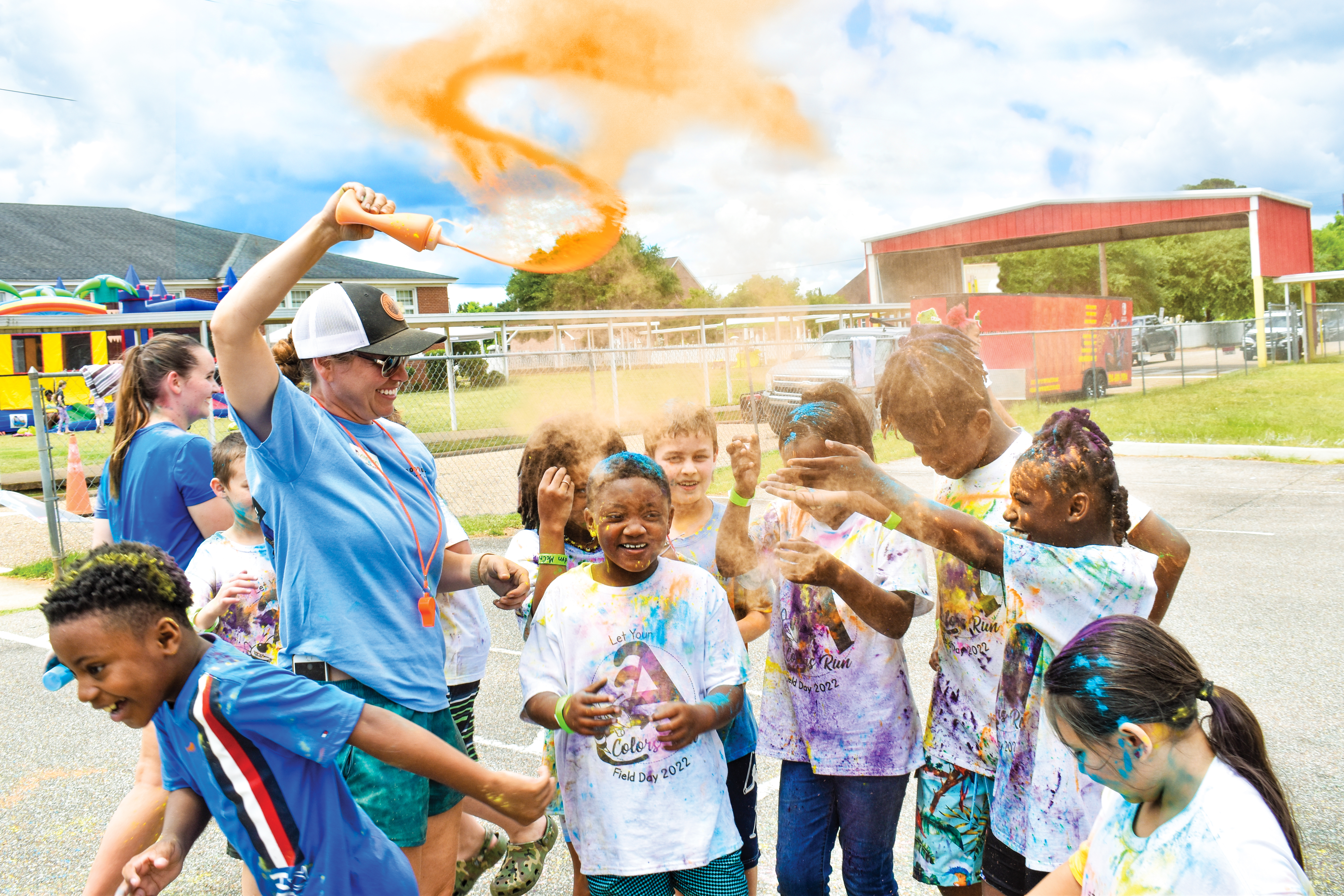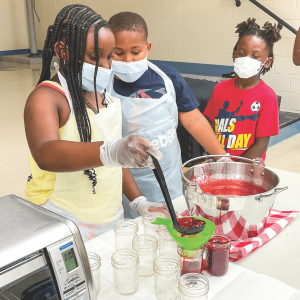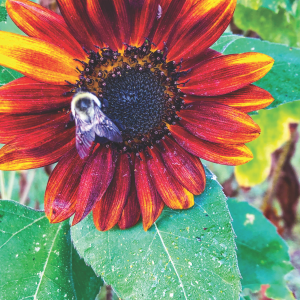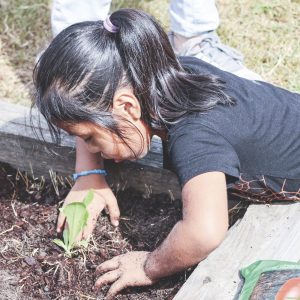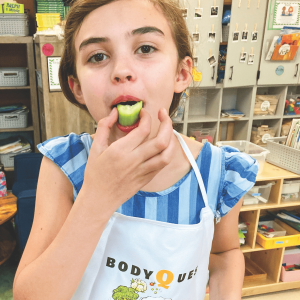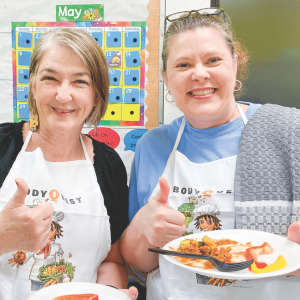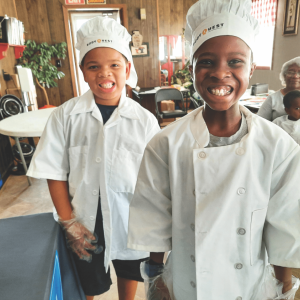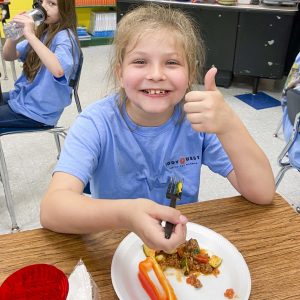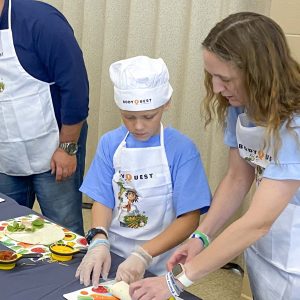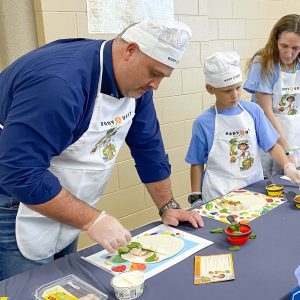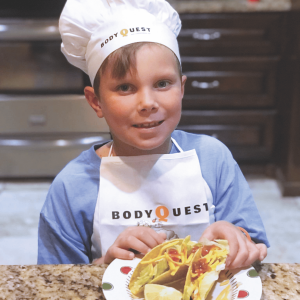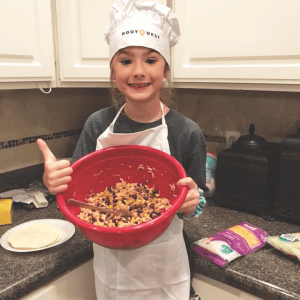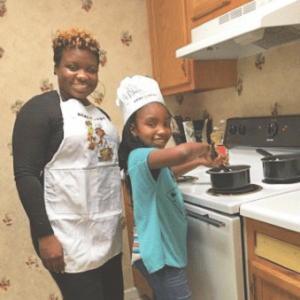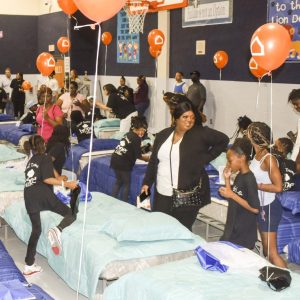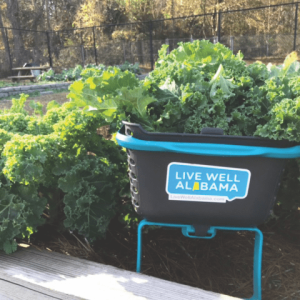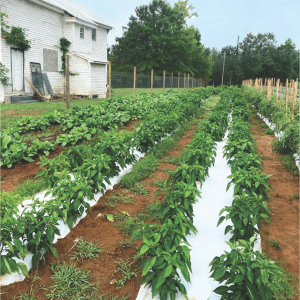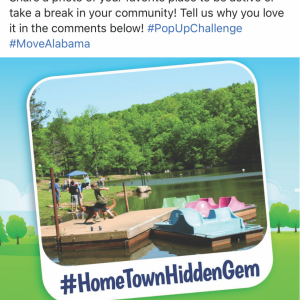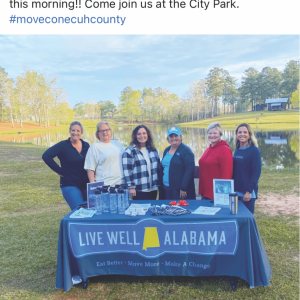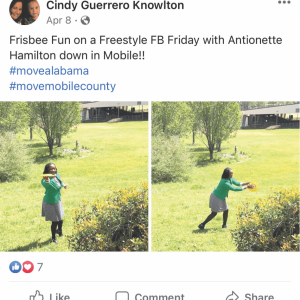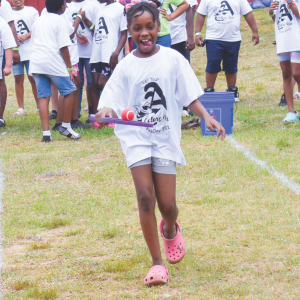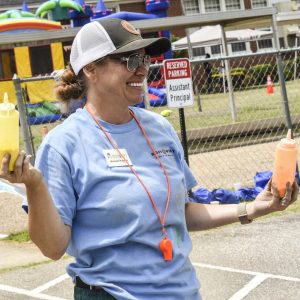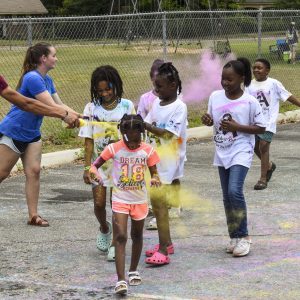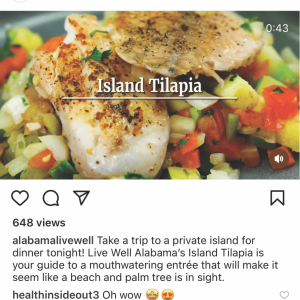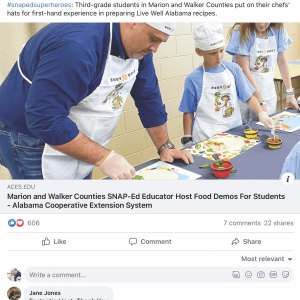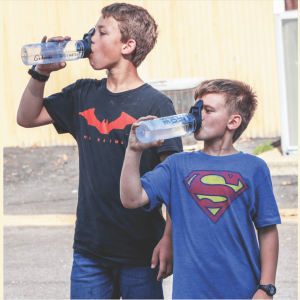Home & Family

Alabama Extension at Auburn University Supplemental Nutrition Assistance Program – Education (SNAP-Ed) continued to pave the way for a healthier Alabama during 2022.
SNAP-Ed uses an evidence-based, multi-level approach to support the health of Alabamians, especially those with limited resources. To accomplish this mission, SNAP-Ed educators provided nutrition education to 29,823 individuals across a wide variety of settings, such as schools, food pantries, grocery stores, and many more.
SNAP-Ed educators also partnered with local communities to facilitate 407 unique policy changes, systems changes, and environmental improvements to make it easier for 53,732 people with limited resources to choose healthy foods, healthy beverages, and physically active lifestyles.
In addition, SNAP-Ed reached eligible individuals through Live Well Alabama, a statewide social marketing campaign encouraging Alabamians to Eat Better, Move More, and Choose Water.
33 Educators | 56 Counties | 29K Impacted by Education | 53K Impacted by Policy, Systems & Environmental Changes
Live Well In Schools
Body Quest
During the 2021-2022 school year, SNAP-Ed educators provided Body Quest (BQ) to 7,269 third graders in 168 schools. All schools were SNAP-Ed eligible, with more than 50 percent of students receiving free or reduced-price meals through the National School Lunch Program. Classes included a mix of educator-led discussions, guided vegetable tastings, and iPad app reinforcement lessons narrated by the BQ Warriors who possess superpowers from eating healthy foods.
A statewide impact evaluation of BQ was conducted with schools assigned to a treatment or control group. Students in both groups participated in self-reported pre- and post- assessments. Data were analyzed and significant differences (p < 0.05) were observed in the treatment group from pre- to post-assessment and compared to the control group. The control group classes received BQ classes later in the school year, after the post-assessments were completed.
Culinary Adventures
SNAP-Ed educator Ginger Eatman set up cooking stations for her Body Quest students in several Marion and Walker County schools with the help of principals, teachers, and student volunteers. Students made and tasted Body Quest recipes and demonstrated a healthy snack for their fellow classmates.
Positive Changes
At the end of Body Quest, significant differences in behaviors and attitudes were observed among treatment students compared to before Body Quest and compared to the control group.
- Healthy Eating — After BQ, students ate more vegetables, fruit, and whole grains.
- Beverage Consumption — After BQ, students drank more water and fewer sugary beverages.
- Attitudes — After BQ, students said they actually liked eating vegetables and whole grains more.
Parents Getting Involved
Body Quest Parents Choose Water
BQ reached parents in multiple ways with messages and resources to encourage choosing water instead of sugary beverages.
Parents completed pre- and post-assessments to measure beverage consumption. After BQ, parents reported increased water intake and decreased sugary beverage intake compared to before BQ.
- Weekly text messages and social media posts encouraged parents to #ChooseWater.
- Educational materials, recipes for fruit-infused water, and reusable water bottles equipped parents for more water consumption.
- Billboards and digital ads prompted parents to #ChooseWater
BQ Families Cook Together
Parents received inexpensive, simple, and kid-friendly vegetable recipes to prepare with their children at home.
Text Messaging Encourages Change
During BQ, 3,496 parents participated in a weekly educational texting program. At the end of BQ, a texting poll with participating parents (n= 173) measured effectiveness of the text messages and self-reported behavior change.
- 94% used tips provided in text messages.
- 91% found more ways of being active with their 3rd grader.
- 88% noticed their child ate more fruits and vegetables, tried new foods, or both.
- 74% kept fewer sugary beverages in their homes.
BQ Schools Make A Change
Making healthy food and physical activity priorities at schools is critical. Research shows kids who have healthy eating habits and get regular physical activity are more likely to have better academic performance, attendance, self-esteem, classroom behavior, and lower obesity rates. SNAP-Ed educators leveraged strong partnerships with 66 schools to facilitate 156 positive changes creating healthier school environments for more than 26,000 students.
- Policy changes encouraged the establishment of new food distribution sites, such as food pantries, and supported healthy nutrition in schools.
- Systems changes increased the availability of fresh, local produce in school cafeterias.
- Environmental improvements established or sustained edible school gardens, improved opportunities for physical activity, and provided tastings and signage throughout the school encouraging students to make healthy choices.
66 Schools | 28 Counties | 26,069 Students | 156 Positive Changes
Hope To Dream
Mobile County SNAP-Ed educator Antionette Hamilton initiated a partnership with the local Ashley Furniture HomeStore to facilitate a “Hope to Dream” bed giveaway for 75 third graders at Craighead Elementary School after learning that many of the children needed a bed. Football players from Williamson High School and the University of South Alabama helped host the special event where they led the children in physical activity and shared a healthy lunch. With sleep being an important part of a healthy lifestyle and necessary for learning, the community was happy to pull together to meet a need.
School Gardening
SNAP-Ed educator Carolyn Rothschild partnered with school cafeteria personnel to expose children to fresh vegetables through school garden efforts in Monroe and Wilcox Counties. Vegetables from the gardens were served as part of the school lunch menus, and Rothschild’s nutrition education encouraged students to try them.
Eat Better, Move More
Kids having a fun and healthy summer.
Once school was out for the summer, Alabama youth stayed active and healthy with Eat Better, Move More (EBMM). Six engaging nutrition and physical activity lessons with pre- and post-assessments were offered through Boys & Girls Clubs, school summer programs, and local community centers.
In the summer of 2022, EBMM empowered 2,068 kids to improve their health behaviors. By the end of EBMM, kids chose whole grains, fruits and vegetables, and water more often, and they participated in at least one hour of physical activity per week. Kids also demonstrated a better understanding of healthy eating.
Live Well In Communities
Food Pantries
 Through the new Live Well Alabama Healthy Food Pantry Program, SNAP-Ed educators partnered with 58 food pantries serving almost 30,000 clients to assess current healthy food offerings and practices. Educators helped highlight existing Alabama pantry successes: 89 percent of pantries offer foods from each of the five food groups, 98 percent provide canned foods free of rust or dents, and 70 percent offer fresh fruits and vegetables.
Through the new Live Well Alabama Healthy Food Pantry Program, SNAP-Ed educators partnered with 58 food pantries serving almost 30,000 clients to assess current healthy food offerings and practices. Educators helped highlight existing Alabama pantry successes: 89 percent of pantries offer foods from each of the five food groups, 98 percent provide canned foods free of rust or dents, and 70 percent offer fresh fruits and vegetables.
Educators helped pantries create action plans to increase access to and appeal of healthy foods for pantry clients. SNAP-Ed educators facilitated 34 positive changes in 18 food pantries, improving nutrition security for 8,730 pantry clients per month. Changes included offering on-site nutrition education, enhancing the visual display of healthy options, connecting pantries to sources of fresh produce, and assisting with fundraisers and food drives to increase healthy food offerings.
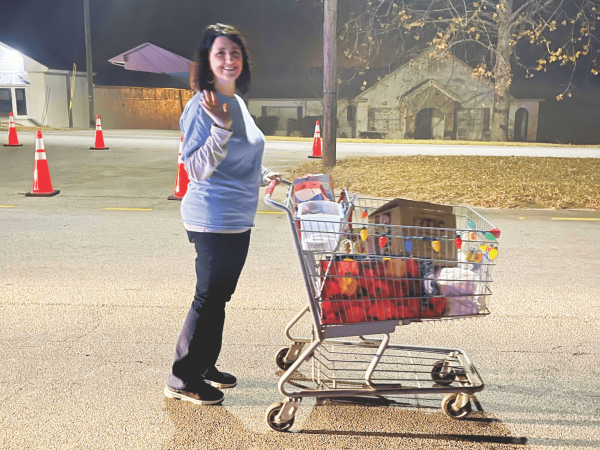 Healthy Food Drive
Healthy Food Drive
Sherri Mulder, SNAP-Ed educator in Randolph and Chambers Counties, partnered with community volunteers and Cub Scout Pack 4260 to collect food donations for a local food pantry during the Wedowee Christmas Parade. The community was encouraged in advance to bring healthy items to place in a grocery cart as the parade float passed. At the end, 195 pounds of food donations were collected.
Grocery Stores
SNAP-Ed educators partnered with 12 local food stores to provide in-store nutrition education and support shoppers in making healthy food choices. SNAP-Ed educators worked with store owners to suggest enhancements to product offerings and store layouts and to display promotional signage. Together, these efforts directed more than 2,348 shoppers per day toward healthier foods and beverages.
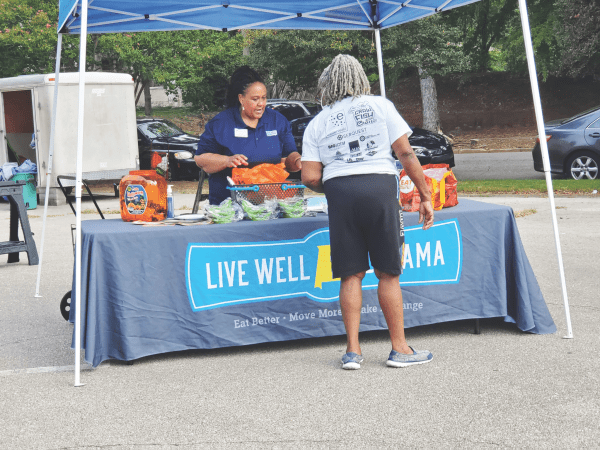 Double Up Food Bucks
Double Up Food Bucks
SNAP-Ed partnered with Hunger Solutions Institute at Auburn University to promote the Gus Schumacher Nutrition Incentive Program, also known as Double Up Food Bucks. This program allows SNAP participants to double their fruit and vegetable purchases with locally grown produce. SNAP-Ed educators Bernadine McCaskill-Ransom (Mobile County), Desiree Hutcherson-Bates (Jefferson County), and Cheri Huff (Tuscaloosa County) educated the public on the program while providing nutrition education at the participating sites, giving clients healthy recipes along with ways to maximize their food dollars.
Farmers Markets
SNAP-Ed educators helped 8 farmers markets increase fresh produce sales by providing nutrition education, encouraging 1,072 customers per market day to purchase and eat more locally grown fruits and vegetables.
SNAP-Ed educators partnered with local farmers and community organizations to make farmers market produce more accessible to people with limited resources through the promotion of SNAP EBT payments, voucher programs, and improvements in days and hours of operation.
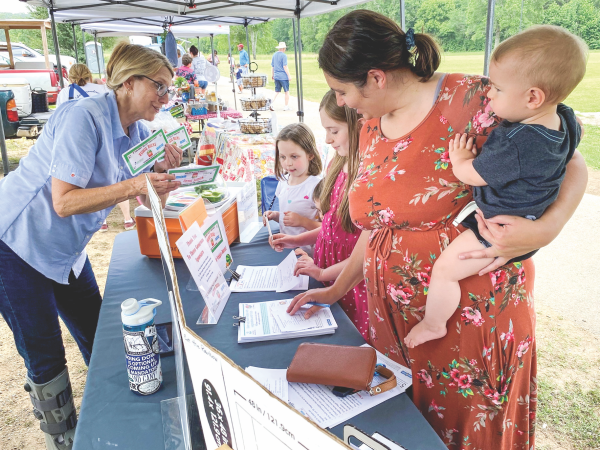 Veggie Bucks
Veggie Bucks
In a program initiated by St. Clair County SNAP-Ed educator Cindy Harper, children received Veggie Bucks vouchers to buy fruits and vegetables from local farmers at the St. Clair Farmers Market. Community donations financed the Veggie Bucks program. Harper worked with the market manager to solicit donations.
In the program’s first year, they received about $1,300 in donations. Harper said she gives out about 50 $2 Veggie Bucks vouchers to children who come by the Extension tent each week. At the tent, Harper provides nutrition education to children and their families while giving a recipe sample or taste of in-season produce.
Gardens
SNAP-Ed educators supported establishing or sustaining 36 school and community gardens, making fresh vegetables available to 10,806 Alabama residents. SNAP-Ed educators played a vital role in connecting gardens to community organizations such as food pantries, school cafeterias, or summer feeding sites.
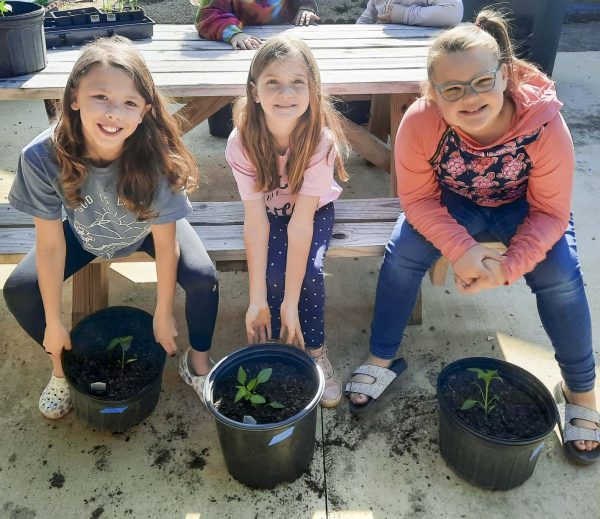 SNAP-Ed educators and community garden volunteers weighed produce and determined the total harvest weight from gardens. In FY22, gardens supported by SNAP-Ed produced more than 1,800 pounds of produce valued at $3,345. This equates to 7,925 servings of fruits and vegetables, which are enough for 1,585 adults to meet the USDA daily recommendations.
SNAP-Ed educators and community garden volunteers weighed produce and determined the total harvest weight from gardens. In FY22, gardens supported by SNAP-Ed produced more than 1,800 pounds of produce valued at $3,345. This equates to 7,925 servings of fruits and vegetables, which are enough for 1,585 adults to meet the USDA daily recommendations.
Bucket Gardens
Colbert and Lawrence Counties SNAP-Ed educator Jennifer Palmer worked with the Northwest RC&D, local businesses, and Alabama Extension’s Grow More, Give More initiative to create bucket container gardens for third-graders at three local schools. Through the garden effort, students gained hands-on experience planting vegetables while learning about nutrition.
Let’s Move Alabama
SNAP-Ed and the Expanded Food and Nutrition Education Program (EFNEP) partnered to provide six communities in Alabama with the chance to get moving with friends, family, and neighbors while exploring their community! Move Alabama invited residents to complete 20 state and local physical activity challenges during the months of March and April. Those who completed the challenges were entered to win prizes from small businesses and local donors, including family activity game sets and physical activity trackers.
During the challenge, participants were encouraged to motivate each other in the new Move Alabama public Facebook group. Through social media, participants learned more about healthy eating and active living and connected with others competing in the activity challenge.
SNAP-Ed and EFNEP created and distributed 3,700 challenge flyers across the six participating communities to encourage participation. More than 300 participants joined the Move Alabama Facebook page, where individuals posted engaging photos of themselves and their families moving more in their community.
Want to get involved in 2023?
Check out the Move Alabama Facebook page for more details!
Kids on the Move
Michelle Puckett, SNAP-Ed educator in Barbour and Henry Counties, developed Move Alabama challenges specifically for classrooms in partnering schools. Students completed ten classroom-based challenges and were rewarded with a color run for their efforts. The color run consisted of physical activity education and time to run around a track while getting splashed with orange, pink, blue, green, and yellow paint.
Live Well Social Marketing
Live Well Alabama is a statewide social marketing campaign that uses a variety of communication channels, such as billboards, social media, and more, to reach and engage with the SNAP-Ed audience. Campaign messages are integrated with all SNAP-Ed activities and serve to promote behavior change, support community-level changes, and build awareness of our mission and resources. At the local level, SNAP-Ed educators reinforce campaign messages by sharing Live Well Alabama materials during nutrition education and policy, systems, and environmental change work. Partnering organizations also display promotional signage to help people identify healthy options in grocery stores and food pantries or encourage physical activity in parks and schools. Campaign materials have been audience tested and evaluated to show that SNAP-Ed participants who interact with campaign materials are more likely to take action to improve their health.
- Billboards blanketed the state, making 120 million impressions in 51 counties and reaching 142,000 SNAP-Ed eligible adults.
- Live Well Alabama had more than 148,000 video views. That is more than 452,200 minutes or 754 hours of Live Well Alabama content viewed on social media.
- Stories written for Live Well Alabama social media were shared by other news outlets, potentially reaching more than 541,000 people through online and print media.
- Digital advertisements made more than 12 million impressions and drove viewers to visit the Live Well Alabama Facebook page more than 23,000 times
- The Live Well Alabama text messaging campaign shared weekly educational tips with more than 6,000 people.
Connecting
SNAP-Ed educator Desiree Hutcherson-Bates in Jefferson County used social media as a way to connect with the community and share fun, active events such as the Bike Rodeo at Tarrant Intermediate School in Birmingham.
Spotlight Success
#FoodFriday
Weekly posts featuring Live Well Alabama recipe videos reached more than 400,000 accounts, received more than 1,400 engagements, and were viewed more than 132,000 times.
#SnapEdSuperheroes
Success stories highlighting the work of SNAP-Ed educators reached more than 271,000 accounts and received more than 13,000 engagements.
#ChooseWaterWednesday
Weekly posts that encouraged choosing water over sugary drinks reached nearly 87,000 users and received more than 7,400 engagements.
Follow Us!
Live Well Alabama continues to grow and engage with our community on social media. We deliver educational content, motivation, encouragement, and stories about SNAP-Ed educators and their partners making real change in their local communities.
More than 700,000 accounts were reached and people engaged by liking, sharing, or commenting more than 331,000 times. Our Facebook page was visited more than 39,000 times and received more than 300 new followers for a total of 3,629 followers.
More than 106,000 accounts were reached and people engaged more than 20,000 times. Our Instagram page was visited 1,765 times, gaining more than 100 new followers for a total of more than 300 followers in our second year. Videos on Instagram were also viewed more than 7,600 times.
More than 347,000 accounts were reached, and people engaged more than 3,900 times. Our Twitter profile was visited more than 5,900 times and now has more than 300 followers.
SNAP-Ed Professionals
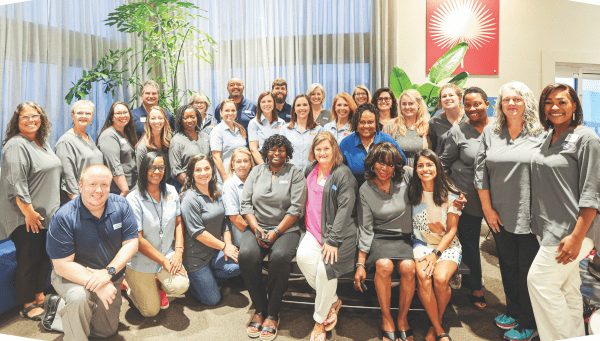 Creating a Culture Shift in Alabama
Creating a Culture Shift in Alabama
Alabama Extension at Auburn University SNAP-Ed’s statewide network of passionate nutrition educators is committed to improving the environment around health and well-being for Alabamians, focusing on limited-resource communities. With strong partnerships at the local, state, and national levels, widespread and lasting change is achievable. Improving dietary and physical activity behaviors of individuals and families and building partnerships to improve the health of communities are among key SNAP-Ed efforts to make the healthy choice the easy choice.
The Educators
| Educator | County/Counties |
|---|---|
| Annette Casteel | Winston & Franklin |
| Antionette Hamilton | Mobile |
| Bernadine McCaskill-Ransom | Mobile |
| Brandalyn Clark | Jackson |
| Carolyn Rothschild | Monroe & Wilcox |
| Chasity Little | DeKalb |
| Cheri Huff | Tuscaloosa |
| Cindy Harper | St. Clair |
| Debbie Beverly | Conecuh & Covington |
| Della Bramley | Cullman & Marshall |
| Desiree Hutcherson-Bates | Jefferson |
| Dominguez Hurry | Bullock & Macon |
| Gianna Edmunds | Tallapoosa & Coosa |
| Ginger Eatman | Marion & Walker |
| Gladys Blythe | Dallas & Perry |
| Jennifer Palmer | Lawrence & Colbert |
| Kayla Shealy | Calhoun |
| Le’Anne Almond | Houston & Dale |
| Leslie White | Pike & Crenshaw |
| Lisa Wood | Pike & Crenshaw |
| Meaghan Robertson | Clay & Talladega |
| Meaghanne Thompson | Cherokee & Cleburne |
| Michelle Puckett | Henry & Barbour |
| Paola Lopez | Lee & Russell |
| Sara Watson | Chilton & Bibb |
| Shalong Hamilton | Hale & Greene |
| Sherita Hale | Sumter & Pickens |
| Sherri Mulder | Randolph & Chambers |
| Sicily Yarbrough | Geneva & Coffee |
| Tammy Glass | Marengo & Choctaw |
| Tammy Hall | Calhoun |
| Torie Ennis | Etowah |
| Valerie McLain | Butler & Lowndes |
State Staff and Authors
| Sondra M. Parmer, PhD |
| Katie Funderburk, PhD, RD |
| Erin Reznicek, MS |
| Sofia Sanchez, MBA, RB, LDN |
| Mitch Carter, MS |
| Dustin Duncan |
| Melanie Smith |
| Kelly Mailen |
Sondra Parmer, Program Leader for Nutrition Programs; Katie Funderburk, SNAP-Ed Program Coordinator; Erin Reznicek, Extension Specialist; Sofia Sanchez, Extension Specialist; Mitch Carter, Administrator, Outreach Programs; Dustin Duncan, Communications and Marketing Specialist; Melanie Smith, Media Production Specialist; and Kelly Mailen, Executive Support Assistant; all with Auburn University
New January 2023, SNAP-Ed FY22 Annual Report, FCS-2720
Past Reports
- Download a PDF of SNAP-Ed FY21 Annual Report, FCS-2613.
- Download a PDF of SNAP-Ed FY20 Annual Report,FCS-2469.
- Download a PDF of SNAP-Ed FY19 Annual Report, FCS-2391.
- Download a PDF of SNAP-Ed FY18 Annual Report, FCS-2302.
For questions and accessibility or to request accommodations, contact Extension Communications and Marketing at 334-844-5696 or extcomm@aces.edu.

